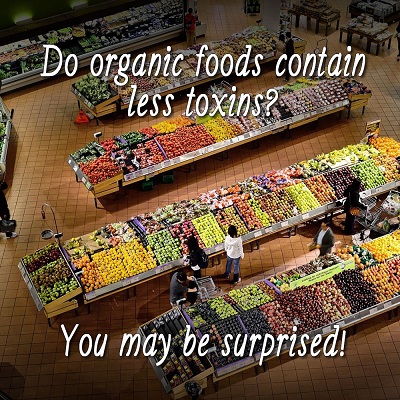 The term ‘healthy eating’ is spoken about more than ever before and it has made many people more food conscious over the years. As such organic produce sales are booming because of the high demand.
The term ‘healthy eating’ is spoken about more than ever before and it has made many people more food conscious over the years. As such organic produce sales are booming because of the high demand.
Organically grown and harvested foods such as fruit, vegetables, honey, milk, and juices are more readily available now and can be found in most supermarkets.
Organic Foods
Organic foods are produced via natural farming methods and certified as being organic. These include fruits, grains, vegetables, meat, and dairy products. The plants are farmed without using chemical pesticides and herbicides, synthetic fertilizers, or sewage sludge so the soil remains healthy. They do not include genetically engineered foods that can affect biodiversity.
Meat and dairy products are considered organic if they are from animals that are raised without growth hormones and antibiotics, are free-range, and in a healthy and clean living environment to produce quality meat and dairy products.
Are Organic Foods Healthier Than Non-organic Foods?
Many people claim that there is not enough evidence to prove that organic food is healthier than non-organic food. However, based on one recent study, organic foods have more nutrients that can boost immunity and protect from allergies.
- Organic fruits and vegetables have high levels of antioxidants, Vitamin C, and have no chemical pesticides.
- Organic animal products including milk, eggs, and meat have higher levels of Omega-3 fatty acids and conjugated linoleic acid that contain many health benefits.
- Organic crops like grains have less cadmium toxicity and pesticides deposit. However, the danger of contamination by bacteria is the same for organic and inorganic foods.
Natural Toxins Found in Edible Plants and Animals
If a plant is organic, it produces natural toxins like other living organisms. They do not affect the plants but can cause serious health threats to people and animals when ingested.
These toxins are produced as defense mechanisms to protect the plants from pests and molds. Animals, fish, and shellfish can also ingest toxin-bearing microbes and organisms that could have harmful effects if you ingest them.
To help you be more aware, some of the most common natural toxins that endanger our health are explained below.
Parasitic Fungi and Bacteria
These can live in celery roots, citrus plants, parsnips, and various medicinal plants. Plants induce them when they are stressed or damaged. When ingested, they cause stomach problems or serious skin side effects when exposed to sunlight.
Plant Protein Lectins
These toxins defend plants against nature but can have side effects when you consume them undercooked or uncooked. They cause bloating, diarrhea, gas, nausea, upset stomach, and vomiting. They rarely affect people because plants with lectins such as beans, lentils, peas, peanuts, and soybeans are usually cooked well before eating.
Toxic Fungus Called Mycotoxins
These are natural compounds created by molds or fungi that grow in different crops and animal feeds before and after harvesting and during storage, in periods of warm or humid weather.
Mycotoxins can be present in apples, cereals, coffee beans, dried fruits, nuts, wheat bran, pea hulls, maize grain, milk, meat, and vegetables. Consuming extremely contaminated foods can cause cancer, auto-immune diseases, and sudden death in people and animals.
Alkaloids
Plants belonging to the Solanaceae family naturally produce these toxins as a reaction to bruising, ultraviolet radiation, bacteria, and to defend against disease, pests, and herbivores. Some of these plants are eggplants, tomatoes, and potatoes.
The highest toxin concentration is in green tomatoes and potato sprouts, notably their green parts. Some Alkaloids are found in the fruits, leaves, roots, and seeds of plants.
Toxins in Wild Mushrooms
Some species of these fungi have various toxins that can cause confusion, diarrhea, hallucination, salivation, visual problems, and vomiting even if you peel and cook them. If symptoms of poisoning are delayed, the toxins can still severely affect your kidney, liver, or nervous systems.
Ways to Avoid the Dangers of Natural and Synthetic Toxins
Natural toxins can be present in different edible plants and animals even if they are organic. Also, chemical pesticides and herbicides may contaminate inorganic foods. Both natural and synthetic toxins are serious threats to your health.
- A large variety of crops and edible foods, including animal feeds, contain natural toxins so don’t assume that they are safer than nonorganic foods.
- Discard damaged, bruised, discolored fruits and vegetables and foods with mold.
- Store your potatoes in a cool, dark, and dry place, and avoid eating the green and sprouting parts.
- Avoid consuming wild mushrooms unless they are proven non-poisonous.
- Wash your fruits and vegetables thoroughly in running water, even those with inedible skins to avoid contaminating the insides with toxins or pesticides.
There are health risks that you may encounter whether the foods you consume are organic or not. These include toxins from man-made pesticides or natural toxins in plants and animals. Health experts advise that it’s best to protect yourself from them with proper cleaning, handling, preparing, and cooking of foods. Include a variety of foods in your diet to provide balanced nutrition to help prevent health issues.






